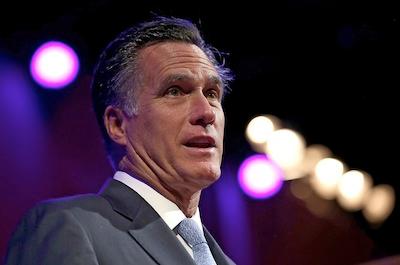Trans-Atlantic Affairs: Would Romney “strengthen our partnerships” in the world?
Republican presidential candidate Mitt Romney speaks during an American Legion convention on August 29, 2012 in Indiana.
Although European countries are America's closest allies, they were mentioned only in connection to other issues during the debate. Mitt Romney accused President Obama of weakening American influence in the world. Outlining his foreign policy earlier this month, he said, "It is the responsibility of our President to use America’s great power to shape history — not to lead from behind, leaving our destiny at the mercy of events."
Obama countered that "the world was divided" when he took office and came together on issues such as sanctions against Iran. He has deliberately taken an understated approach to global affairs in an effort to repair the previous administration's perceived excesses. For example, although his administration was slow launching its support for the Arab Spring, it contributed more military support than any other country to NATO's Libya campaign in 2011 while playing a behind-the-scenes role diplomatically by letting Britain and France take the lead.
That approach minimized concerns abroad that the US was launching yet another war in the Islamic world, and it helped repair the split between Western allies over George W. Bush’s invasion of Iraq, earning Obama huge popularity in Europe. Four years after Obama drew a crowd of 200,000 in Berlin, a poll shows that 75 percent of Europeans would still vote for him, and only 8 percent for Romney.
Other polls indicate the United States could sink to Bush-era levels of unpopularity if Romney is elected.
Romney’s gaffe-strewn summer trip to Europe reinforced that view.
Romney also criticized Obama for being soft on Russia, a country he's characterized as "our number-one geopolitical foe." However, the president's reset in relations with Moscow has resulted in progress on reducing nuclear arsenals, opening supply routes to Afghanistan and cooperation on issues such as Iran and counterterrorism.
We rely on support from listeners and readers like you to keep our stories free and accessible to all. Monthly gifts are particularly meaningful because they help us plan ahead and concentrate on the stories that matter. Will you consider donating $10/month, so we can continue bringing you The World? Donations made between now and Dec. 31 will be matched 1:1. Thanks for investing in our work!
